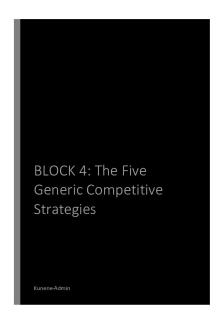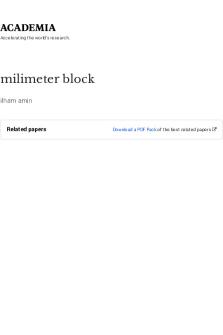IM-V2-Assignment-Level 6 Block 2 PDF

| Title | IM-V2-Assignment-Level 6 Block 2 |
|---|---|
| Author | Jawad Tauheed |
| Course | International Marketing |
| Institution | Gulf College |
| Pages | 7 |
| File Size | 224.6 KB |
| File Type | |
| Total Downloads | 27 |
| Total Views | 147 |
Summary
International Marketing...
Description
In academic affiliation with
GULF COLLEGE – MUSCAT – SULTANATE OF OMAN UNDERGRADUATE BUSINESS PROGRAMME ACADEMIC YEAR: 2019 -2020 (Second Semester)
FRONT COVER ASSIGNMENT Module Title: International Marketing Module Code: BSB10186-6 Method of Assessment: Assignment Weighting: 100%
Module Credits: 15
Level: 6
Semester/Teaching Block: 2
Part-Time/Full-Time: Both
Examiner: Dr Apollo
Student ID:
Student Name:
Additional Information (if any):
Version 2
Page 1 of 7
Module Name:
International Marketing
Module Code:
BSB10186-6
Module Leader:
Dr. Apollo
Weighting:
100%
Submission Date:
?
You should hand in one hard copy of your assignment by the time and date above to the appropriate ‘hand-in location’ at the Block C of Gulf College. Fill in the front cover (staple together with your assignment). MAKE SURE that you fill in all the relevant details on this form. An acknowledgement will be given to you upon receiving your assignment. This is your receipt, keep it. You have to email one soft copy in MS word format to [email protected] by mentioning the subject and file name in following format “IM-L6-B2-STUDENT ID-STUDENT NAME”. You can submit work by post, but you must send it recorded delivery, it must be postmarked two days before the deadline date and a copy must be kept by you in case it is lost in the post. Faxed assignments will not be accepted. Assignments must be submitted by the due date. The only circumstance in which assignments can be submitted late is if an extenuating circumstances form is submitted at the same time. In these circumstances work may be submitted up to 2 weeks late only. If the extenuating circumstances are upheld, the assignment will be graded; otherwise a zero marks will be awarded.
Maximum Word Length:
2500 words
State the number of words used at the end of your assignment. You may include diagrams, figures etc. without word penalty. A sliding scale of penalties for excess length will be imposed according to the amount by which the limit has been exceeded. You have to mention total word count at end of assignment before references. 01-10% 11-20% 21-30% 31%+ Version 2
excess excess excess excess
No penalty 10% reduction in the marks 20% reduction in the marks Work will be capped at a pass i.e. 40% or grade point 4. Page 2 of 7
NB. None of the above penalties will be used to change a student mark which is above the pass mark, to one that is below the pass mark. Therefore the maximum penalty for exceeding the word limit will be a reduction to a pass grade. This assignment will assess the following learning outcomes: 1) Identify and critically evaluate the major environmental influences affecting global and international markets to justify recommended strategies; 2) Apply appropriate analytical models and frameworks to analyse, assess and critically appraise global and international marketing situation. Write an Individual Assignment up to 2500 words on analysing following case: Topic Al-Jufair Food Industry LLC is the producer of farm fresh Potato Chips in various flavors in the Sultanate of Oman. The premier product of the industry is the chili flavored Potato Chips “Chips Oman” which is the most popular product of its kind. You have to critically analyse and evaluate its marketing strategies, applying the principles and practices of international marketing concepts. As a distinguished graduate from Gulf College Oman, the company decided to appoint you as a consultant. Your main task is preparing an International marketing plan to assistance the company to make the final decision of its intended business. The following inquiries are the underlying bases for the feasibility study; 1) A brief Introduction to the subject of the study. Compare and contrast Domestic and International Marketing. 2) Reasons to go international, discuss mode of entry. 3) Adoption of marketing mix, pricing strategy, product standardization vs. adaptation and segmentation. 4) Discuss brand positioning plan and advertising strategy. 5) How external environment influences the international marketing strategies in new international market. 6) Marketing strategies and plan with respect to the host country with direct reference to the organization’s processes, people and products.
Version 2
Page 3 of 7
7) Significance of “think global while act local strategies”. 8) What are the challenges regarding company’s micro environment. 9) Conclusion
Guidelines to Students: Style and Format Write down the exact number of words at the end of your essay. You may include diagrams, figures, appendices etc. without word penalty. A sliding scale of penalties for excess length will be imposed. The first page must be designed as a cover page name, student ID and batch. Computer format is compulsory. Make sure you use a consistent format for your essay (font, font size, margins etc.). Referencing Style for the Assessment In the text of your assignment if you quote directly from an article, journal or book this should appear in quotation marks (“…”). The source should then be acknowledged by stating the author’s last name and date in brackets at the end of the quotation, e.g. (Rushmore & de Roos, 2002). If you paraphrase or reword from a journal, article or book the source should either be acknowledged within the sentence, e.g. According to Kasavana & Brooks (2001), revenue management is……..or at the end of the sentence before the full stop, e.g. (Kasavana & Brooks, 2001). At the end of the assignment all references should be listed on a separate page headed REFERENCES. Make sure that all references are complete; and that all references mentioned in the text are given in the list of references and vice versa. Any items not cited should be listed separately under BIBLIOGRAPHY or FURTHER READING using the Harvard referencing style. Structure Your essay should be structured in 3 parts: introduction, main body and a summary/ conclusion paragraph at the end of the essay. The introduction as well as the summary at the end should not exceed 3 paragraphs. The main body is the longest part of the essay/ assignment.
Version 2
Page 4 of 7
Deadline Your assignment will be submitted before the deadline. The assignment will not be accepted at any later date than the set deadline. No excuses will be entertained.
Essay Assessment Criteria: 1. Presentation (10%) - avoid missing sections or irrelevant material, and maintain logical flow. 2. Direction and coverage, structure and sequencing (10%) 3. Theoretical understandings (30%) - demonstrate an error-free understanding of the basic concepts and project your readings in the report in the form of a relevant citation style. 4. Use of relevant examples and evidence (10%) - all your assignments are related to Market Operation specific. Avoid use of generalities will reflect lack of effort in studying the company. 5. Level of analysis and evaluation (20%) - demonstrate the ability to link between the theory and application along with a critical evaluation. 6. Conclusion (10%) - your conclusion and recommendations must convince the reader that they tie with the logical flow of your analysis. 7. Referencing (10%) - An authority that contributes to your answers should be mentioned accordingly using the Harvard Style Referencing
Note: More critical and depth analysis is appreciable. Assessment Submission The assignment should be submitted in accordance with Gulf College/ Staffordshire University regulations, giving full name, student registration number, program details and module details.
Note: This is a written individual assignment. If you miss the topic or if the tutor has good reason to believe that you have either copied the assignment or that it was written by anybody other than yourself, the assignment will automatically be given “Zero”. Version 2
Page 5 of 7
Plagiarism Warning Summary
Plagiarism occurs if you use somebody else's work in an assignment or exam answer, but fail to state where you got the material from.
It can happen in any type of assessment where you are given the questions or tasks in advance.
If another student uses your work in their answer(s), both you and they will be punished when caught.
Punishments for committing plagiarism can be very severe.
25-30 students get caught in the Business school every year.
The details Plagiarism is a form of cheating in which students use the work of others and present it as their own. Staffordshire University publishes a fully detailed description of what the term ‘plagiarism’ means on the University’s main web-site under the heading ’Procedures for dealing with suspected cases of academic dishonesty . We strongly recommend that you go and read the full document at the above address. Meanwhile, here is an extract of some of the relevant content. You will have committed plagiarism and may be caught, reported and punished (as described below) if you:
Copy extensively from the work of others (from sources such as books, magazines, journals, web-sites for example) and submit the work as your own. NB It is acceptable to refer to the work of others as long as you do not use too much, and reference your sources properly. If you do not know how to do this, please follow the guidelines given in the document entitled ‘Adding quotations and references to your written work’ at this web-site address: http://www.staffs.ac.uk/schools/business/bsadmin/staff/s3/jamr.htm
Copy another students’ work and submit it for assessment under your own name.
Allow another student to copy your work and they then submit it for assessment under their name
This last item is of particular importance; few students seem to understand what it means. If, for example, you allow another student to borrow your work and they subsequently copy some that work and present it as their own, you and they will both be punished even though someone else copied your work.
Version 2
Page 6 of 7
The risks of working with other students Some assessment tasks are explicitly designed for group work, and it will be made clear that a group answer is expected from you. All other tasks are intended as an assessment of your individual comprehension and performance, and group answers are not permitted. In individually assessed forms of assessment your work must be different from that of every other student. Plagiarism can occur in assignments and any examination where the questions are issued to students in advance. In both cases it is possible for you to ask other people about how best to answer the questions or complete the necessary tasks You should be aware that different modules and subjects may have different requirements. In some subjects, answers to questions may, for example, require every student on a module to employ or refer to the same diagram(s), concepts and the like in order to construct an acceptable answer. You should note, however, that even in these circumstances your explanations of what the diagrams mean, and any other writing referring to any common diagrams and concepts should all be in your own words. Moreover, the situation may be very different on other modules, where the submission of work that has a very similar structure, or the use of very similar materials such as concepts, diagrams, quotations and the like, to that of another student, may lead to you being accused of plagiarism. The picture is complicated and, unfortunately, it is not possible to give advice that is directly relevant to every module you study. If you are unsure about how to avoid plagiarism in any specific module, then rather than hoping and guessing, you should ask for guidance from the member of staff who delivers that module. Our overall advice is straightforward; by all means discuss how best to answer questions or complete tasks with your colleagues, but when it comes to actually writing your answers - DO IT ALONE! What happens if you get caught? Contrary to some student rumours, getting caught and being punished for committing plagiarism is not an extremely unusual student offence. The Business School typically uncovers and reports for disciplinary action 25 to 30 students each year for plagiarism. Examination Boards may punish offending students in any manner that they deem fit. Typical punishments Boards may choose range from reducing grades, making students re-sit modules, through to failing students on a module or an entire award. The University regards this form of cheating as a serious offence. Full details of the range of likely punishments can be found on the University’s web-site under the heading ’Procedures for dealing with suspected cases of academic dishonesty. Please consider yourself warned! ********* GOOD LUCK **********
Version 2
Page 7 of 7...
Similar Free PDFs

IM-V2-Assignment-Level 6 Block 2
- 7 Pages

Block Test 6 Q A
- 3 Pages

Block 6 - Gruppen (ab 04
- 14 Pages

Block 2 - Business Ethics
- 5 Pages

Block 2 Study Guide
- 9 Pages

Microeconomics Exercises Block 2
- 21 Pages

Block test 6 - Click UP Memo
- 6 Pages

Block 2:Medication Quiz Review
- 1 Pages

Physiologie Fragen Block 2 komplett
- 38 Pages

Block 4
- 9 Pages

Block 3
- 7 Pages

milimeter block
- 2 Pages

Human Biology Block 2-9 Notes
- 204 Pages

Atrioventricular Block
- 19 Pages

Block 5
- 15 Pages

Block-5 MCO-3 Unit-2
- 18 Pages
Popular Institutions
- Tinajero National High School - Annex
- Politeknik Caltex Riau
- Yokohama City University
- SGT University
- University of Al-Qadisiyah
- Divine Word College of Vigan
- Techniek College Rotterdam
- Universidade de Santiago
- Universiti Teknologi MARA Cawangan Johor Kampus Pasir Gudang
- Poltekkes Kemenkes Yogyakarta
- Baguio City National High School
- Colegio san marcos
- preparatoria uno
- Centro de Bachillerato Tecnológico Industrial y de Servicios No. 107
- Dalian Maritime University
- Quang Trung Secondary School
- Colegio Tecnológico en Informática
- Corporación Regional de Educación Superior
- Grupo CEDVA
- Dar Al Uloom University
- Centro de Estudios Preuniversitarios de la Universidad Nacional de Ingeniería
- 上智大学
- Aakash International School, Nuna Majara
- San Felipe Neri Catholic School
- Kang Chiao International School - New Taipei City
- Misamis Occidental National High School
- Institución Educativa Escuela Normal Juan Ladrilleros
- Kolehiyo ng Pantukan
- Batanes State College
- Instituto Continental
- Sekolah Menengah Kejuruan Kesehatan Kaltara (Tarakan)
- Colegio de La Inmaculada Concepcion - Cebu